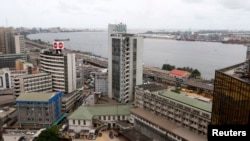LAGOS —
Nigeria will increase the amount it borrows overseas to around 40 percent of all debt over the next three to five years, from 12 percent currently, to lower its funding costs, the head of the debt office said on Monday.
DMO Director General, Abraham Nwankwo, said he expected Nigeria's debt to GDP ratio to fall to 17 percent over the same period from 21 percent, as Africa's second-biggest economy switches into cheaper foreign debt.
The move came eight years after Nigeria was forgiven some $18 billion of external debt by the Paris club.
"Nigeria has developed a medium-term debt strategy... which will improve the portfolio mix and reduce our average cost of funds," Nwankwo told Reuters in a telephone interview.
Nigeria is one of several African countries seeking to ride the wave of cheap money generated by ultra-loose monetary policy in the West and Japan.
With the world's top central banks driving yields on safe assets close to zero, investors are increasingly seeking fixed income from frontier markets like Vietnam and Romania.
Rwanda, heavily dependent on foreign aid and whose robust economic growth still reflects a recovery from its 1994 civil war, was able to issue a 10-year Eurobond last month at 6.875 percent, attracting subscriptions eight times the bond's size.
Nwankwo said foreign debt was now 800 basis points cheaper than domestic debt, adding that a proposed $1 billion Eurobond issue was part of the strategy to move towards foreign loans.
"Optimal mix"
Total domestic debt stood at 6.49 trillion naira ($41 billion) at end-March, 2013 while foreign debt was $6 billion.
"We have to look at the optimal portfolio mix, cost structure... and source of funding," Nwankwo said.
Analysts welcomed Nigeria's move to cheaper foreign loans, noting that global low interest rates in contrast to tight monetary policy at home will help reduce debt service costs and free up money to invest in badly-needed infrastructure.
"While some in Nigeria [those with long memories of the Paris Club negotiations] might express concern over the desire to increase external debt once again, from the perspective of reducing debt service costs, some rebalancing makes plenty of sense," Razia Khan, head of Africa research, said.
"However, Nigeria's dependency on a single commodity - oil - for much of its earnings, is still a concern."
Nigeria's central bank has kept interest rates on hold at 12 percent since last November, citing the need to maintain single-digit inflation and stabilize the naira currency, which has kept domestic borrowing costs relatively high. Lower currency risk has made foreign debt more attractive to Nigeria.
Standard Bank emerging market debt strategist Samir Gadio said "ample global liquidity" would enable Nigeria to place a Eurobond at reduced cost.
But he added that pressure to borrow more domestically would most likely increase as Nigeria approaches elections in 2015. During previous elections, patronage has very quickly drained state coffers.
DMO Director General, Abraham Nwankwo, said he expected Nigeria's debt to GDP ratio to fall to 17 percent over the same period from 21 percent, as Africa's second-biggest economy switches into cheaper foreign debt.
The move came eight years after Nigeria was forgiven some $18 billion of external debt by the Paris club.
"Nigeria has developed a medium-term debt strategy... which will improve the portfolio mix and reduce our average cost of funds," Nwankwo told Reuters in a telephone interview.
Nigeria is one of several African countries seeking to ride the wave of cheap money generated by ultra-loose monetary policy in the West and Japan.
With the world's top central banks driving yields on safe assets close to zero, investors are increasingly seeking fixed income from frontier markets like Vietnam and Romania.
Rwanda, heavily dependent on foreign aid and whose robust economic growth still reflects a recovery from its 1994 civil war, was able to issue a 10-year Eurobond last month at 6.875 percent, attracting subscriptions eight times the bond's size.
Nwankwo said foreign debt was now 800 basis points cheaper than domestic debt, adding that a proposed $1 billion Eurobond issue was part of the strategy to move towards foreign loans.
"Optimal mix"
Total domestic debt stood at 6.49 trillion naira ($41 billion) at end-March, 2013 while foreign debt was $6 billion.
"We have to look at the optimal portfolio mix, cost structure... and source of funding," Nwankwo said.
Analysts welcomed Nigeria's move to cheaper foreign loans, noting that global low interest rates in contrast to tight monetary policy at home will help reduce debt service costs and free up money to invest in badly-needed infrastructure.
"While some in Nigeria [those with long memories of the Paris Club negotiations] might express concern over the desire to increase external debt once again, from the perspective of reducing debt service costs, some rebalancing makes plenty of sense," Razia Khan, head of Africa research, said.
"However, Nigeria's dependency on a single commodity - oil - for much of its earnings, is still a concern."
Nigeria's central bank has kept interest rates on hold at 12 percent since last November, citing the need to maintain single-digit inflation and stabilize the naira currency, which has kept domestic borrowing costs relatively high. Lower currency risk has made foreign debt more attractive to Nigeria.
Standard Bank emerging market debt strategist Samir Gadio said "ample global liquidity" would enable Nigeria to place a Eurobond at reduced cost.
But he added that pressure to borrow more domestically would most likely increase as Nigeria approaches elections in 2015. During previous elections, patronage has very quickly drained state coffers.





